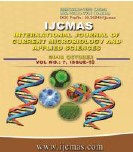


 National Academy of Agricultural Sciences (NAAS)
National Academy of Agricultural Sciences (NAAS)

|
PRINT ISSN : 2319-7692
Online ISSN : 2319-7706 Issues : 12 per year Publisher : Excellent Publishers Email : editorijcmas@gmail.com / submit@ijcmas.com Editor-in-chief: Dr.M.Prakash Index Copernicus ICV 2018: 95.39 NAAS RATING 2020: 5.38 |
Immersion of painted idols and addition of organic wastes in the lake water, as a part of religious activities, is a common religious practice in India. These activities add to the contamination of water with alkali, alkaline earth metals and heavy metals and therefore, degrade water quality and limit conservation of good quality water in the lakes. In this pretext, periodic analysis of Madiwala and Lalbagh lake water were carried out to investigate the impact of idol immersion activities on the lake water quality. In Madiwala lake, the maximum concentrations of calcium and magnesium were recorded to be 9.31 and 4.6 ppm, respectively after one month of immersion. The maximum concentrations of Na and K were 51.3 and 37 ppm respectively, after seven days of immersion in Madiwala lake water. The pH of the Lalbagh lake water dropped from 8.89 to 8.47 in the post immersion period. The BOD and COD levels also increased from 17.5 and 135.5 to 27.4 and 237.5 mgL-1, respectively in Lalbagh lake water which reflects reduction in the dissolved oxygen content of the lake water. The concentrations of different inorganic ions including heavy metals (Cr, Cd, Ni and Pb) were found to increase in the post immersion period. The water of these lakes is used for irrigation as well as for other household purposes in the adjoining areas. Thus, it may pose threat of heavy metal pollution in the near future if the problem is not addressed in due course of time.
 |
 |
 |
 |
 |